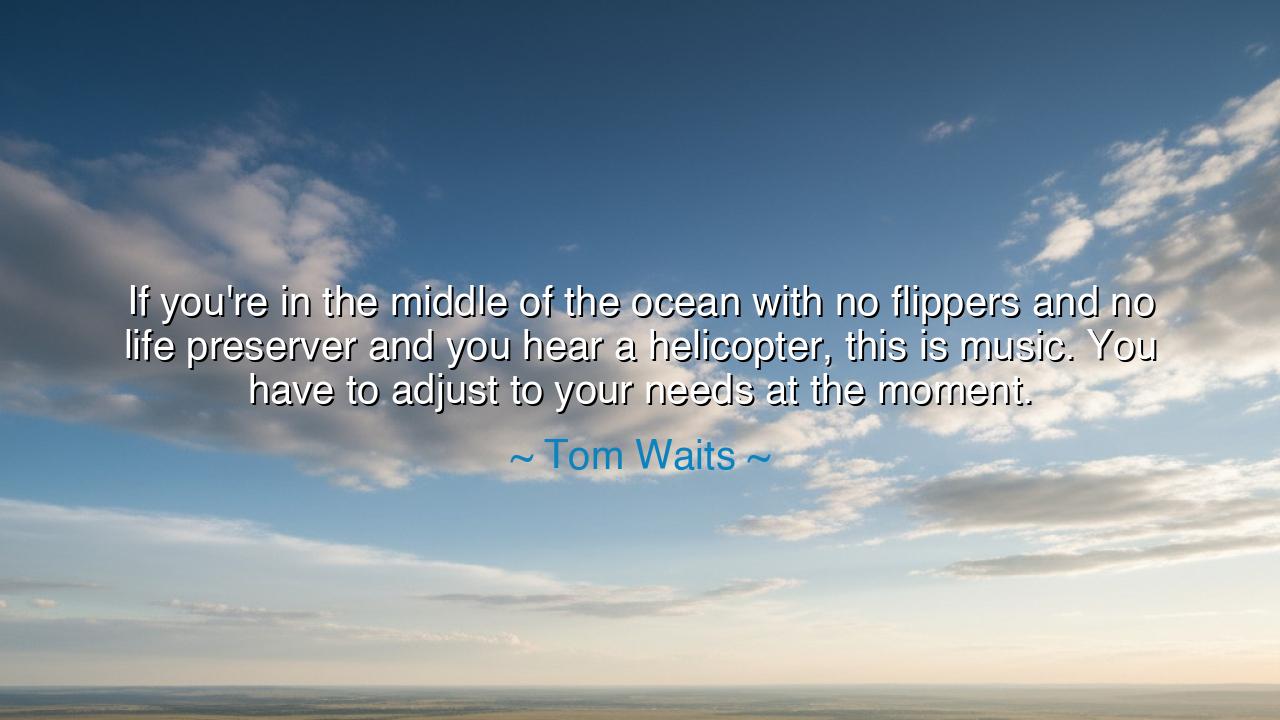
If you're in the middle of the ocean with no flippers and no
If you're in the middle of the ocean with no flippers and no life preserver and you hear a helicopter, this is music. You have to adjust to your needs at the moment.






When Tom Waits spoke the words—“If you’re in the middle of the ocean with no flippers and no life preserver and you hear a helicopter, this is music. You have to adjust to your needs at the moment”—he was not merely speaking of melody or rhythm. He was unveiling the truth that music is not confined to instruments or voices, but to the cry of salvation when one is drowning, to the sound that answers the deepest need of the human spirit. He teaches us that beauty is not absolute, but bound to context; that the song of life is what sustains us when we are most fragile, most desperate, most in need.
The ancients knew this truth in their bones. Consider the soldiers at the walls of Troy, wearied after years of siege, who heard at last the signal of retreat or the rallying cry of their commander. To them, it was no lyre, no harp, but it was music nonetheless, for it spoke of hope, of survival, of a chance to endure another day. What might seem to one man a mere horn blast was to another the hymn of life itself. So it is with us: music is not always in the form of art, but in the harmony between our need and the sound that answers it.
In this saying, Waits shows us that perception is shaped by necessity. To the starving man, the crack of a loaf’s crust is a symphony; to the weary traveler, the sound of rain upon a roof is a lullaby. What others dismiss as noise may, in a moment of need, become sacred song. Thus, the wise learn not to fix their hearts on rigid definitions of beauty or art, but to recognize the music hidden in life itself, waiting to be revealed by circumstance.
There is also courage in this teaching. To “adjust to your needs at the moment” is to live with openness and adaptability. Life does not always give us the orchestra we desire. Sometimes it gives us the beat of our own heart in a dark night, sometimes the roar of an engine in the distance, sometimes the laughter of a stranger when we are about to break. The resilient soul is not one who demands perfection, but one who can hear in these sounds the very song that keeps them moving forward.
History itself bears witness. During the long march of the Cherokee Trail of Tears, survivors spoke of the sound of distant rivers or the cries of kin as both sorrow and strength. For some, those sounds became music, because in them was the pulse of endurance, the reminder they were not utterly abandoned. Just as a man drowning hears rescue in the whirring blades of a helicopter, they found in their harsh sounds the faint but real thread of hope. It was not beautiful by common measure, yet it was the only song of survival they could cling to.
The lesson is clear: do not wait for life to hand you perfect instruments before you sing, nor perfect conditions before you listen. Instead, learn to recognize that what sustains you—be it a voice, a chance, or a signal—is the true music of that moment. To cultivate this wisdom, train your heart to ask, “What sound, what sign, what rhythm is calling me to endure today?” For those who can hear music in unlikely places will never be without a song.
Practically, this means living with gratitude and attentiveness. When you are weary, listen for the words of comfort that arise, even from unlikely lips. When you are lost, hear the music in directions offered, no matter how plain. When you are afraid, let the smallest reassurance become your symphony. Adjust yourself to the moment, and allow what life gives you to become the saving harmony you need.
Thus, Tom Waits reminds us that true music is not only in the concert hall or the songbird’s throat—it is in the very pulse of survival and the notes of salvation that rise when we need them most. To hear it is to live. To recognize it is to be wise. And to adjust to it is to endure.






AAdministratorAdministrator
Welcome, honored guests. Please leave a comment, we will respond soon